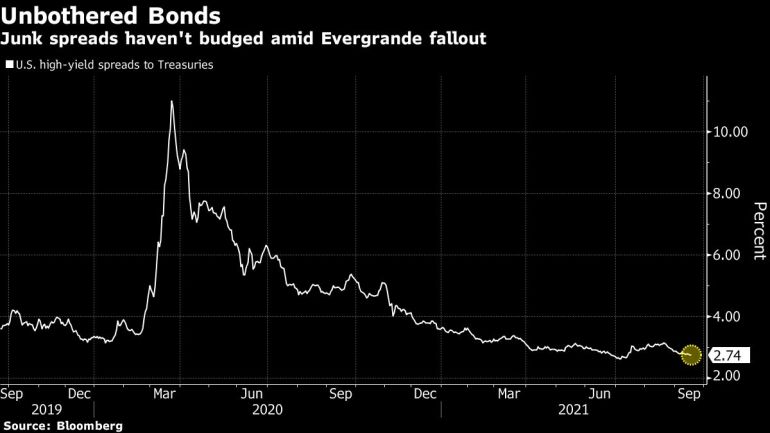Evergrande uproar traps stocks with little to do with China | Business and Economy News
A Chinese owner implodes and, in no time, shares of US social media and auction companies plummet. The chain reaction may say more about the extreme altitude of global risk assets than the economic contagion.
While it doesn’t take too much research to understand why commodities and banks are shaking in the vortex around Evergrande, the connection between the lender’s struggles and a stock like Twitter Inc. or EBay Inc. is more. difficult to see.
“You’ve got a whole basket of things to worry about – throw that title into the mix and that gets it all wrong. So there is going to be an irrational risk reduction that doesn’t logically connect, â€Art Hogan, chief strategist at National Securities, said of the Evergrande crisis. “Does it make sense for tech stocks to sell? No, but in a risk-free scenario everything tends to be for sale, even cryptocurrencies. “
While there may not be an obvious connection between some U.S. tech stocks and China, that doesn’t mean the sell doesn’t make sense. Dizzying valuations have been bear food for months and Federal Reserve hawks have been circling around. Evergrande may seem like a shaky rationale, but Monday’s rout is similar in size to half a dozen other market dips in 2021 that required no news to ignite.
In fact, investors took the opportunity to sell in a market with a perfect price. The Russell 2000 Small Business Index, generally seen as more US-oriented and with less international exposure than the S&P; 500, led declines, falling as much as 3.6% on Monday. An index of regional banks, crammed with companies like Bank of Hawaii Corp. and PacWest Bancorp, lost 3.9% at one point.
The iShares MSCI Emerging Markets ex China ETF, which aims to exclude China, fell more than 2%, while Twitter, which is not directly accessible in the country, lost more than 4% at one point . And companies operating solely in the United States, like the Kroger Co. supermarket chain, have also fallen.
In other words, there are a lot of assets involved in the sale, and “I don’t know if that’s entirely appropriate,” Hogan said.
Still, the word “contagion” is thrown out because of Evergrande’s size. The Chinese real estate developer has about $ 300 billion in liabilities, more than any other real estate developer in the world, Bloomberg reported, and it accounts for about 16% of the banknotes in circulation in the Chinese high yield dollar bond market. . While concerns about the company’s ability to service its debt have been prevalent for weeks, those concerns grew more prominent this week with some $ 83.5 million in interest on a dollar bond at five years expiring Thursday for the company.
But investors also face many other worries: weakened earnings forecasts, a slow change in Federal Reserve policy, uncertainty in Washington DC, and more.
“With valuations high, the Fed meeting tomorrow, we have a perfect storm for a very difficult day today,†Katy Kaminski, chief research strategist and portfolio manager for AlphaSimplex Group, said in an interview. on Bloomberg Television with Jonathan Ferro. “For us, this is much more of an underlying issue that is much more economical and pervasive in nature as opposed to just being financial.”
Not all of Monday’s falls were without reason. A Goldman Sachs basket of Russell 1000 companies with the strongest trade exposure to China fell 3.3% in the session, its worst day since mid-May, while another focused on stocks heavily exposed to the country’s supply chains – also tracked by the bank – fell 3.7% at worst.
Jerry Braakman, chief investment officer for First American Trust in Santa Ana, Calif., Said it also made sense for commodities like copper, iron ore and crude oil to fall.
“China is still a huge demand driver for commodities because it does all of the manufacturing for us,†he said. Braakman also singled out some of the tech giants, including Apple Inc. and Tesla Inc., with great exposure in China. Apple in 2020 recorded around 15% of its revenue in China, a figure that rose to 21% for Tesla, according to data compiled by Bloomberg.
For Gene Tannuzzo, portfolio manager at Columbia Threadneedle, it makes sense that names linked to the Chinese real estate sector and related commodities are affected, so he and his team are watching the fall in iron ore prices. “If other commodities follow lower – oil, copper – that generally correlates with lower returns for the US high yield,” and the latter still suggests that the risk of contagion is low, he said. . “Everything is a little sweeter today, but none of these graphics look like iron ore yet.”

Wells Fargo Investment Institute’s senior global markets strategist Sameer Samana is also looking at high yield spreads to get a feel for the possibility of contagion. For him, the liquidation of US stocks is much more about extreme positioning and a relentless bearish buying mentality that may have reduced the sidelined cash that is typically used on withdrawals.
“Until US high yield bond spreads widen further, this should be seen as an opportunity for US stocks,†he said.